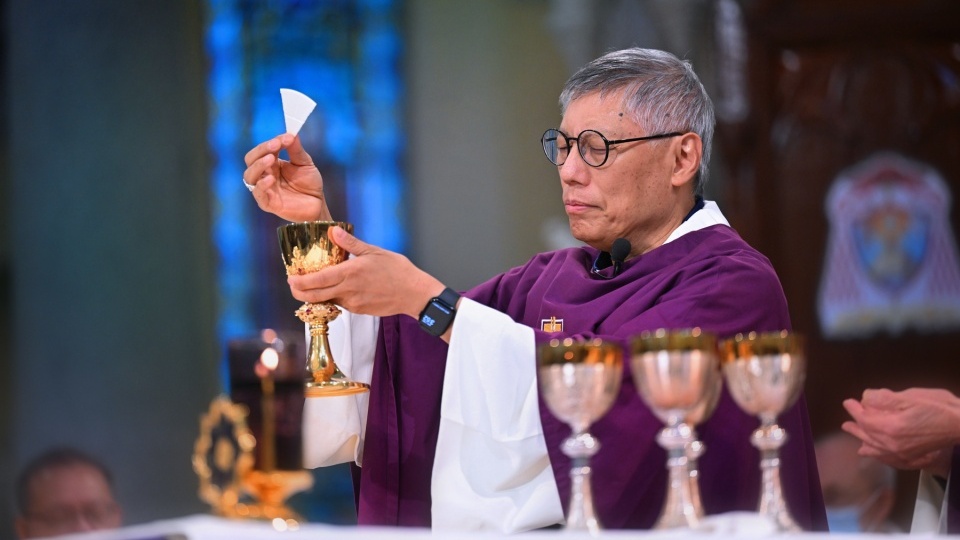
Photo courtesy of Joseph Lam
「願主使你們彼此間的愛情,和對眾人的愛情增長滿溢,就像我們對你們所有的愛情,好堅固你們的心,使你們在我們的主耶穌同他的眾聖者來臨時,於天主我們的父前,在聖德上無可指摘。」(得撒洛尼前書3: 12-13)
親愛的主內姊妹兄弟及各位朋友:
世界主教代表會議第十六屆常務大會第二會期幾週前剛結束,接踵而來的是將臨期。教會作為天主子民,正在等待主教代表會議的主角——聖神——帶來一個新的黎明。我們也熱切期待著 2025 年禧年的開始,它的主題是「希望的朝聖者」,因為「望德不叫人蒙羞」(羅馬書 5:5)
教會是「天主的子民」,包含了教會內每一個人,這也是梵蒂岡第二屆大公會議《教會憲章》的主題。這種教會模式,是我們蒙召成為共議同行教會的基礎。因此,我們是合一的聖事,透過我們尊重多元和多樣性的合一而帶出天主的救恩之愛。
共議同行是教會的本質,也必須以傳教使命為導向。它涉及教會各層面的相聚,互相聆聽、交談和共同分辨。相聚的目的,是要在聖神的引導下達成共識,成為基督臨在我們中間的見證人。
領受了聖職人員和教友職務人員要互相分享並履行他們的權限和權力,承擔各自的責任。換言之,我們是根據信仰團體內不同的角色和職能共負責任。在基督奧體內,我們有來自多元的處境、肩負多樣的角色,而又蒙召在合一之中「共負使命」,以見證基督救恩的愛。這一切將會是賦予生命力的和諧,為當今世界是極其需要的。
因此,為在香港的教會來說,我們皈依的一個重要範疇就是各單位不論其功能和目標,都要學習在不同的工作計劃和使命上合作。
事實上,透過懷著尊重和同理心的聆聽,去轉化我們的內心,是成為共議同行的教會所必須的取向,接著就是共同分辦的決策過程和作出的決定。因此,來自堂區、信仰小團體、修會團體、各委員會、教會職務、工作單位等等的牧者和教友領袖,十分需要去學習和實踐上述過程。
團體分辨的要素包括事前的搜研和準備、祈禱和反思的時間、聆聽和追求公益的內在自由、專心和尊重地聆聽、尋求最大可能的共識和最低公約的共同點,以凝聚共識。
作為牧者和教友領袖,辨認堂區教友和團體成員的不同神恩,為互補神恩很有幫助,也因此為共議同行是有意義的。 「神貧的人是有福的」(瑪竇福音 5:3)鼓勵我們慷慨分享和謙虛接受。作決定時,牧者和教友領袖必須確保透明度和問責,並要為所作的決定進行適當的評估,包括決策過程和決定本身。
我們也蒙召要扎根於並支持所屬的地方教會,為教會的福祉作出貢獻。儘管如此,我們也要提醒自己,我們的終向是超越現世、在乎上主永恆的國度。這是「將臨期」的特別提醒,除了天主的愛和我們往後永恆的居所外,這世上的一切都會完結。
在今次「世界主教代表大會」第二會期的末段,我們的教宗頒布了新通諭《祂愛了我們》,內容是關於耶穌聖心對我們的愛。在這個時間頒布這通諭絕非偶然。正如教宗所說,在當今缺乏心靈的世界中,更新對耶穌聖心的敬禮尤其重要。因著耶穌聖心大愛的激勵下,我們得以共議同行的傳教門徒身份一起前行。
最後,2025 年禧年將於 2025 年 12 月 24 日展開。愛德之外,基於天主應許的望德也是當今世界很需要的價值。最重要的是,讓耶穌聖心的愛轉化我們的內心,好使我們能有效地推動在教會和世界內的轉化。
+周守仁樞機
香港教區主教
2024年將臨期
Advent Pastoral Letter 2024
“May the Lord make you increase and abound in love for one another and for all…, so as to strengthen your hearts, to be blameless in holiness before our God and Father at the coming of our Lord Jesus with all his holy ones. Amen.” (1 Thess 3:12-13)
Dear Sisters and Brothers in the Lord and Friends,
The Second Session of the XVI Ordinary General Assembly of the Synod of Bishops was over just a few weeks ago, and the Season of Advent is right around the corner. The Church, as the People of God, is awaiting a new dawn from the Holy Spirit, the protagonist of the Synod. With enthusiastic anticipation, we look forward to the beginning of the Ordinary Jubilee of the Year 2025 with the theme “Pilgrims of Hope” because “Hope does not disappoint” (Rom 5:5)
The Church as the “People of God,” which incorporates everyone in the Church, is a main theme in Lumen Gentium of the Second Vatican Council. This model of the Church is the foundation of what we are called to become — a synodal Church. As such, we are the Sacrament of Unity, bringing God’s salvific love through our unity while honouring diversity and plurality.
Synodality, which is the nature of being Church, must be mission-oriented. It involves gathering of all levels of the Church in mutual listening, dialogue, and communal discernment. The goal of the gathering is to reach a consensus guided by the Holy Spirit so as to be witnesses of the presence of Christ among us.
Ordained and lay ministers are to share and exercise powers and authority, and shoulder respective responsibilities, i.e., we are co-responsible according to our different roles and functions within the faith community. This is particularly so when we come from a plurality of contexts and diverse roles within the Body of Christ, called to practice the “Together for Mission” in unity so as to witness Christ’s salvific love. It will be a life-giving harmony that is much needed for the world today.
Hence, for the Church in Hong Kong, the different units should learn to collaborate in projects and missions regardless of their functions and goals. Indeed, this is an important aspect of our conversion.
Indeed, an essential approach to becoming a synodal Church is the conversion of our hearts through respectful and empathic listening, followed by communal discernment for decision-making and decision-taking. Hence, it is most desirable for pastors and lay leaders of parishes, small faith communities, religious communities, different commissions, ministries, work entities, etc., to start learning and working on this process.
Key elements for communal discernment include research and preparation, time for prayer and reflection, inner freedom to listen and pursue the common good, listening attentively and respectfully, searching for the widest possible consensus and lowest common denominator, and formulating consensus.
As pastors and pastoral leaders, recognising the different gifts in the parishioners and members of the community is most helpful for the exchange of gifts that are meaningful for synodality. “Blessed are the poor in spirit” (Matthew 5:3) encourages us to share generously and to receive humbly. When making decisions, pastors and lay leaders must ensure transparency and accountability and have appropriate evaluation for the decisions made, including their making and taking processes.
We are also called to take root firmly in where we belong and support our local Church, contributing to its well-being. Nonetheless, we should also remind ourselves that our destiny is the eternal Kingdom of God, which is beyond this world. Such is the special reminder of the Season of Advent, that everything in this world will come to an end, except for God’s love and our eternal abode.
Our Holy Father has recently issued a new encyclical, Dilexit Nos (He loved us), in the latter part of the Second Session of the Synod of Bishops, which is on the love of the Sacred Heart for us. Its issuance was by no means coincidental. As stated by the Holy Father, the renewal of the devotion of the Sacred Heart is of particular relevance in the present heartless world. We journey together as missionary disciples of synodality because of the immense love of the Sacred Heart motivating each one of us.
Finally, the Jubilee Year 2025 will commence on December 24, 2025. Besides love, hope based on the promise of God is also a much-needed value in our world today. Most of all, let the love of the Sacred Heart transform us from within so that we will become effective agents for the transformations in the Church and the world.
+ Stephen Cardinal Chow, S.J.
Advent 2024
來源:天主教香港教區
